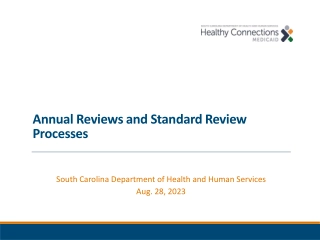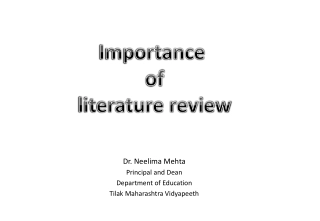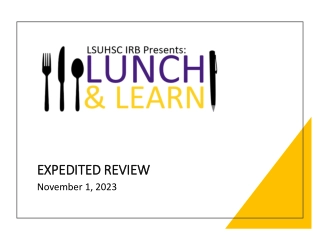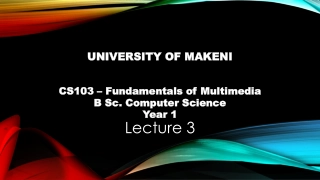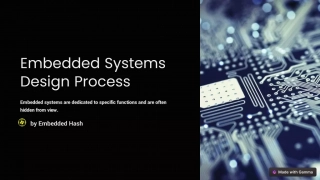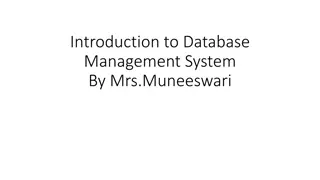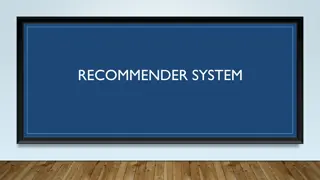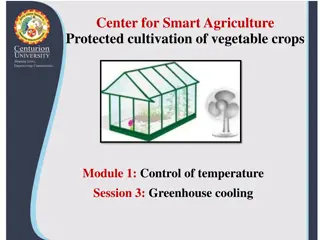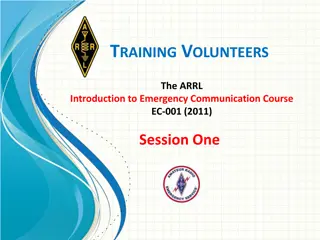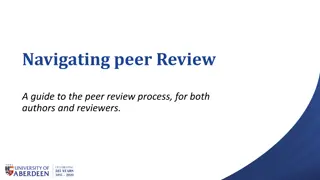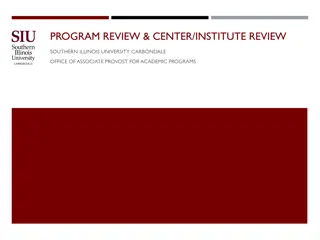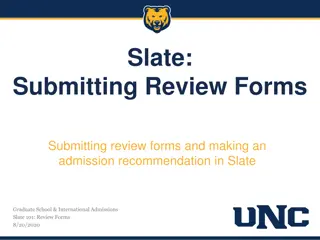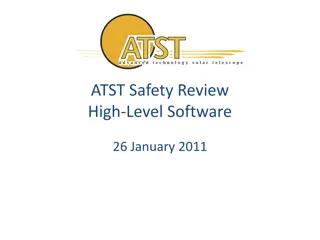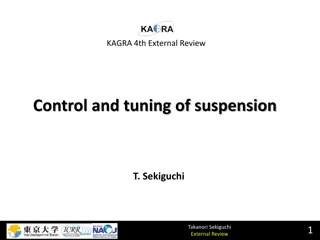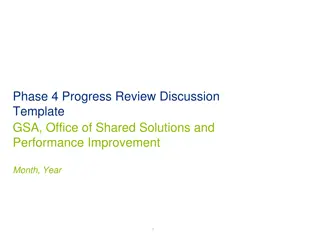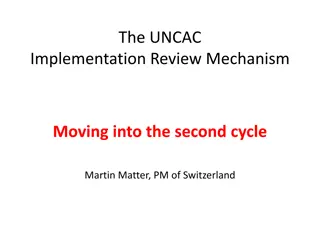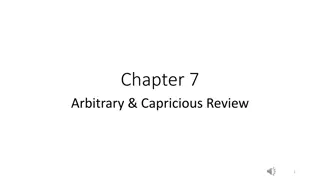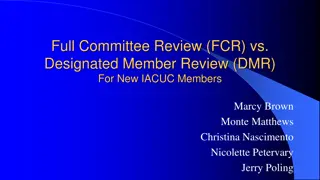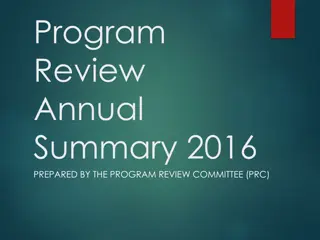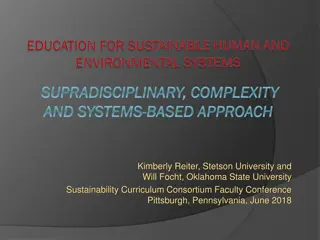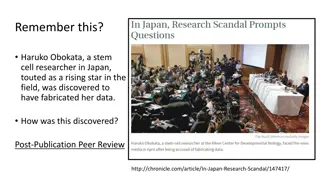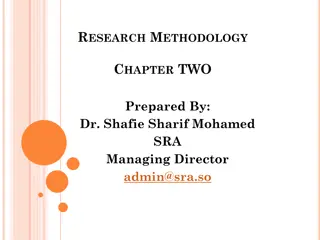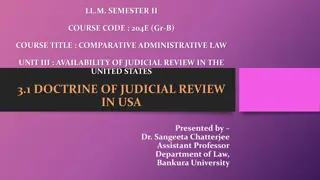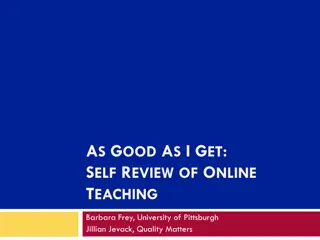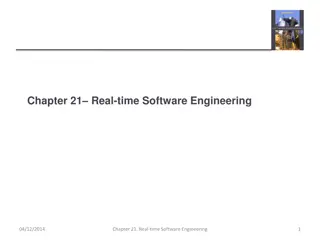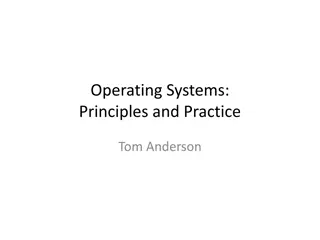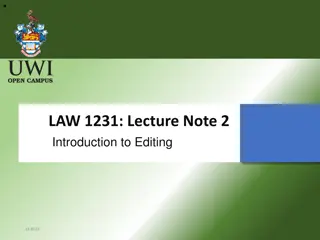Annual Reviews and Standard Review Processes
The annual review and standard review processes implemented by the South Carolina Department of Health and Human Services. Stay informed about agency goals, PHE updates and activities, the annual review cycle, the 90-day grace period, and self-service tools available.
4 views • 11 slides
Importance of literature review
A literature review is a critical component of any research endeavor, providing a comprehensive analysis of existing knowledge in a particular field. This review helps in clarifying conceptual issues, understanding research design, persuading examiners, and contributing new insights to the subject a
0 views • 28 slides
Understanding IRB Review Process for Expedited Research
Learn about the significance of IRB review, levels of review, and categories of expedited review. Discover the criteria for IRB review, including whether the study involves human subjects and contributes to generalizable knowledge. Explore the different levels of IRB review and the specific categori
4 views • 11 slides
Understanding Multimedia Systems: Hardware and Software Components
Multimedia systems require specific hardware and software components to meet the demands of producing and playing multimedia content. Development systems are used for creating content with higher specifications, while playback systems are used for playing multimedia files with lower specifications.
8 views • 46 slides
Embedded Systems Design Process in the Embedded systems
Embedded systems are all around us, from the tiny microcontrollers in our household appliances to the sophisticated control systems in cars and aeroplanes. But how are these systems designed? Let's delve into the basics of the embedded systems design process in simple terms that anyone can understan
2 views • 9 slides
Overview of Distributed Systems: Characteristics, Classification, Computation, Communication, and Fault Models
Characterizing Distributed Systems: Multiple autonomous computers with CPUs, memory, storage, and I/O paths, interconnected geographically, shared state, global invariants. Classifying Distributed Systems: Based on synchrony, communication medium, fault models like crash and Byzantine failures. Comp
9 views • 126 slides
Rapid Review of BSL Commissioning Arrangements by Dr. Michael Brady
NECS commissioned a Rapid Review of British Sign Language (BSL) service provision to identify areas for improvement in access and patient experience, especially during the Covid-19 pandemic. The review focused on stakeholder engagement, options appraisal for commissioning responsibility, and recomme
9 views • 19 slides
Operating Systems
An operating system is a crucial program that manages all other programs on a computer. It handles tasks like input recognition, file management, and device control. There are different types of operating systems such as single-user, single-task systems, multi-user, multi-task systems, real-time ope
6 views • 11 slides
Understanding Information Systems in Organizational Management
Management in organizations is divided into three levels: operational, tactical, and strategic. Each level requires different information systems to support various activities. Operational systems focus on routine transactions and control processes, while middle-level systems aid in semi-structured
9 views • 39 slides
Introduction to Database Management System Explained
This presentation covers the basics of database management systems, including definitions of data, types of data, structured and unstructured data, storing data in computers using file systems and database systems, and issues with file systems like data redundancy, inconsistency, difficult data acce
1 views • 18 slides
Understanding Different Types of Recommender Systems
Recommender systems play a crucial role in providing personalized recommendations to users. This article delves into various types of recommender systems including Collaborative Filtering, Content-Based, Knowledge-Based, and Group Recommender Systems. Collaborative Filtering involves making predicti
0 views • 7 slides
Efficient Greenhouse Cooling Systems for Smart Agriculture
Active summer cooling systems like fan-and-pad and fog systems are crucial for maintaining optimal temperatures in greenhouses. These systems work by utilizing evaporation to remove heat from the air. Fan-and-pad cooling systems have been in use since 1954, where water is passed through pads to cool
1 views • 23 slides
Understanding Emergency Communication Systems for Volunteer Training
This content covers various topics related to emergency communication systems for volunteer training, including agency communication systems, government radio systems for police and fire departments, emergency medical radio systems, American Red Cross frequencies, and types of served-agency radio sy
2 views • 29 slides
Introduction to Embedded Systems Design
Embedded Systems Design, Chapter 1 provides an insightful overview of embedded systems, distinguishing them from general-purpose computers. The chapter delves into the characteristics of embedded systems, their design considerations, and the various types of embedded computers such as general-purpos
1 views • 7 slides
Insights from Surveys on Peer Review & Peer Feedback in Scholarly Communication
Results from surveys on peer review and peer feedback provide valuable insights into the demographics, general attitudes, and major challenges faced in scholarly communication. The data reveals respondent demographics, overall satisfaction with peer review systems, and prevalent problems in current
0 views • 13 slides
Navigating Peer Review: A Comprehensive Guide for Authors and Reviewers
In academic publishing, peer review plays a crucial role in maintaining publication quality. This guide offers a detailed overview of the peer review process for both authors and reviewers, covering topics such as receiving review invitations, manuscript submission, writing effective reviews, and mo
0 views • 31 slides
Southern Illinois University Carbondale Office of Associate Provost for Academic Programs Review
The Program Review & Center/Institute Review at Southern Illinois University Carbondale aims to educate attendees on IBHE requirements, the review process, conflict of interest policies, self-study writing, on-site review involvement, financial support, and available resources. The IBHE mandates rev
0 views • 37 slides
Slate Graduate School & International Admissions Review Forms Overview
Explore the process of submitting review forms and making admission recommendations in Slate Graduate School & International Admissions, including automatic assignment of applications to queues, review of Staff Review Forms, and recommending admission or denial through Faculty Review Forms. Learn ab
0 views • 8 slides
ATST Safety Review High-Level Software Overview
This document provides an overview of the high-level software components involved in the ATST Safety Review conducted on 26th January 2011. It includes details on the Telescope Software Control Systems, Observatory Software Control Systems, and Instrument Software Control Systems, along with respons
13 views • 15 slides
External Review on Control and Tuning of Suspension Systems by Takanori Sekiguchi
Overview of the control design and implementation of digital systems for the KAGRA suspension control, focusing on local controls for SAS, GAS filter controller, IP controller, and noise study. Details include the purpose, configuration, and strategies for controlling thermal drift, mechanical reson
0 views • 21 slides
Phase 4 Progress Review Discussion Template Overview
This template guides a Progress Review discussion involving a Customer, Provider, and Key Stakeholders. It addresses the gaps in common business requirements, risk assessment confidence, deployment readiness, budget impacts, migration costs, and more. The template provides instructions for completin
0 views • 25 slides
Understanding Judicial Review in Administrative Law
In this chapter, the concept of judicial review in administrative law is explored, focusing on the scope of review set by Congress, including trial de novo and independent judgment on evidence. Different standards of review, such as clearly erroneous and substantial evidence, are discussed, highligh
0 views • 23 slides
UNCAC Implementation Review Mechanism: Moving Towards the Second Cycle
The UNCAC Implementation Review Mechanism is progressing into its second cycle, with a focus on evaluating challenges and terms of reference at the conclusion of each review cycle. The performance assessment has highlighted achievements in enhancing awareness and involvement of civil society/private
0 views • 7 slides
Understanding Arbitrary and Capricious Review in Administrative Law
Arbitrary and Capricious Review refers to a highly deferential standard applied to agency decisions, requiring agencies to demonstrate compliance with statutory requirements. The landmark case of Citizens to Preserve Overton Park v. Volpe set the precedent for a thorough judicial review based on the
0 views • 8 slides
Information Systems in Organizations: Overview and Implementation
Information systems play a crucial role in organizations, encompassing transaction processing systems, functional area information systems, and enterprise resource planning systems. This content delves into the purpose of transaction processing systems, the support provided by information systems ac
0 views • 30 slides
Global Peer Review Activities and Future Plans Overview
This document highlights the recent peer review activities conducted by the Subcommittee on Peer Review, focusing on the accomplishments and upcoming plans for enhancing peer review processes. It includes insights from the Global Flyer Survey, training programs, and the development of guidelines, al
0 views • 3 slides
Understanding Full Committee Review (FCR) vs. Designated Member Review (DMR) for New IACUC Members
Explore the differences between Full Committee Review (FCR) and Designated Member Review (DMR) for new IACUC members. Learn the acceptable methods of protocol review, federal requirements, member responsibilities, risks, and best practices for protocol approval. Dive into the two valid methods of IA
1 views • 23 slides
Program Review Annual Summary 2016 by PRC Committee
The Program Review Annual Summary 2016, prepared by the Program Review Committee (PRC), presents a detailed review of instructional programs and administrative units at the College. The report outlines the purpose of the annual review, the themes and issues identified, and recommendations for improv
0 views • 13 slides
Understanding Cascade Control Systems in Industrial Processes
Cascade control systems play a crucial role in improving process control efficiency by incorporating feedback loops within feedback loops. This type of control architecture helps to better handle disturbances and variations in the process by creating secondary loops that monitor specific parameters.
0 views • 8 slides
Understanding Physiology: A Comprehensive Overview and Study Guide
The study of physiology delves into the intricate functions of living systems, encompassing organisms, organs, cells, and bio-molecules. Dr. Ilker Gelisen, a specialist from Wuppertal City Hospital in Germany, provides valuable insights and teachings through a structured program covering various bod
0 views • 19 slides
Sustainable Education for Human and Environmental Systems
Sustainable Education for Human and Environmental Systems (SHES) focuses on fostering sustainable societies through social learning and systems thinking. It aims to promote interconnectedness between human and environmental systems, with a vision of enhancing well-being while maintaining the viabili
0 views • 19 slides
Uncovering Fabricated Data in Stem Cell Research: The Haruko Obokata Scandal
Haruko Obokata, a promising stem cell researcher in Japan, faced allegations of data fabrication, leading to a significant research scandal. Post-publication peer review platforms like PubPeer, PubMed Commons, F1000 Research, and ResearchGate Open Review play vital roles in detecting and addressing
0 views • 11 slides
Effective Strategies for Conducting a Literature Review in Research Methodology
Understanding the importance of literature review in research methodology, this chapter discusses the objectives, aims, and guidelines for writing a comprehensive literature review. It emphasizes the significance of identifying gaps in existing knowledge, structuring the review, and organizing infor
0 views • 33 slides
Health Class Week Review: Body Systems Terminology
Last week in health class, students learned about various body systems, terminology, and functions. Assignments such as tracking sheets, tests, and reviews were completed. The week included activities like Body Systems Jeopardy and discussions on what students had learned. A variety of medical terms
0 views • 19 slides
Understanding the Doctrine of Judicial Review in the United States
Judicial Review is a crucial power of the judiciary to review the constitutionality of laws and executive orders. This article explores the origin of Judicial Review in the United States, focusing on the landmark case of Marbury v. Madison. It delves into the concept, importance, and application of
0 views • 14 slides
Understanding Embedded Systems and Cyber-Physical Systems
Embedded systems are specialized computer systems embedded within larger systems, such as control systems and car controllers. This lecture covers real-time aspects, applications of Cyber-Physical Systems (CPS), and examples like the Boeing 777/Airbus A380 cockpit. It discusses the design process of
0 views • 22 slides
Enhancing Online Teaching Through Self-Review: Challenges and Benefits
Explore the self-review process of online teaching, including identifying challenges, benefits, and different types of reviews. Learn about developing an effective review guide, promoting collegiality, and facilitating professional development in online teaching. Discover the components of a review
0 views • 23 slides
Understanding Real-time Software Engineering for Embedded Systems
Embedded systems play a crucial role in controlling various machines and processes. Real-time software engineering focuses on designing systems that respond instantly to events, ensuring correctness and timeliness. Characteristics like continuous operation, unpredictable environment interactions, an
0 views • 59 slides
Understanding Operating Systems: Principles and Practice in CSE Curriculum
Dive into the world of operating systems through the lens of "Operating Systems: Principles and Practice" by Tom Anderson. Discover how this course fits in the UW CSE curriculum, covering systems programming, operating system interfaces, and distributed systems. Explore the project work on building
0 views • 21 slides
Peer Review Process in Academic Editing
Explore the importance of peer review in academic and professional development, focusing on improving writing skills and critical evaluation. Learn about the benefits of peer review, ways to effectively review work, and various modes of assessment. Understand the peer review process and how it enhan
0 views • 29 slides
